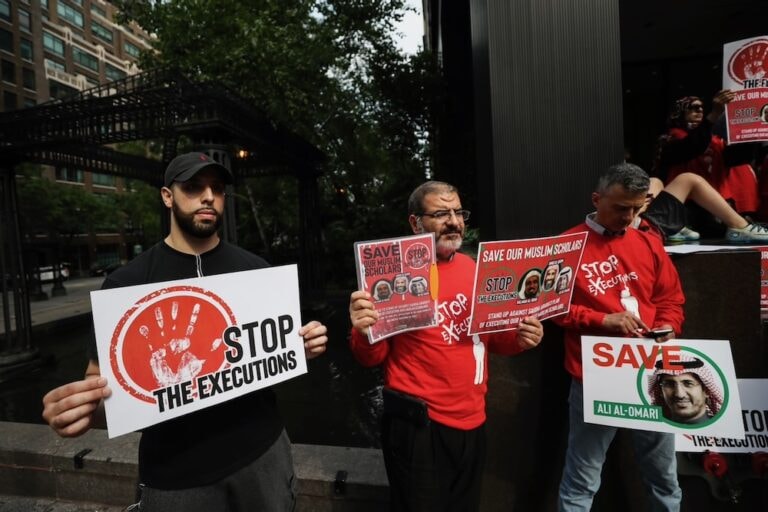Fadhil Makki Al-Manasif's arrest follows amendments to the Press and Publications Law that further restrict the right to free speech.
(Human Rights Watch/IFEX) – Munich, May 3, 2011 – The Saudi interior minister should immediately release Fadhil Makki Al-Manasif, a human rights activist arrested on May 1, 2011, in ‘Awwamiyya in the Eastern Province for taking part in peaceful demonstrations, Human Rights Watch said today. Al-Manasif’s arrest follows amendments to the Press and Publications Law on April 29 that further restrict the right to free speech in Saudi Arabia, and days after the authorities arrested at least 20 peaceful protesters, including two bloggers.
“The latest arrests of peaceful dissidents brings the climate for reform in Saudi Arabia to the freezing point,” said Christoph Wilcke, senior Middle East researcher at Human Rights Watch. “The Saudi ruling family has shown no signs that it might ease its iron grip on the right to express political opinions.”
Al-Manasif, 27, has documented and written about human rights violations, in particular against Shi’a Saudis, for the past two years. He has documented arrests since February of participants in peaceful demonstrations in towns across the Eastern Province, such as a peaceful candlelit march by women in Qatif on April 14.
A colleague of al-Manasif told Human Rights Watch that on April 30, officers of the Ministry of Interior’s Criminal Investigation Department came to his family’s house to arrest al-Manasif and confiscated his father’s national identity card when they did not find him there. The next day al-Manasif presented himself at the police station and was immediately taken into custody for “participating in the demonstrations.”
Saudi authorities arrested more than 20 participants in peaceful demonstrations in the Eastern Province over the previous week, including two bloggers, Reuters reported. The bloggers, Mustafa al-Badr Al Mubarak and Husain Kazhim al-Hashim, had participated in and written about the protests, local sources reported. Since February, peaceful demonstrations of between dozens and hundreds of Saudis have occurred regularly to call for the release of political prisoners, predominantly in the Eastern Province. Small protests for the release of political prisoners led by women have also taken place in Riyadh, the capital, in March. The latest arrests bring the number detained since February 2011 for peaceful expression or assembly to at least 145, a Saudi human rights activist told Human Rights Watch. Human Rights Watch has confirmed at least 120 arrests before the recent arrests of more than 20 people.
The Sa’ud family rules Saudi Arabia as an absolute monarchy. There are no elections to national institutions and no effective means of popular participation in decision making. In early March, the Interior Ministry headed by Prince Nayef bin Abd al-‘Aziz and the Council of Senior Religious Scholars, the highest law-interpreting body, reiterated a ban on all demonstrations.
On April 29, King Abdullah bin Abd al-‘Aziz issued a decree amending the 2000 Press and Publications Law, further restricting the right to free expression. The decree prohibits publishing anything that “contradicts rulings of the Islamic Sharia [law] or regulations in force,” anything that “calls for disturbing the country’s security, or its public order, or services foreign interests that contradict national interests,” anything that “causes sectarianism or that spreads divisions between citizens,” and that “damages public affairs in the country.” New restrictions also include a prohibition on violating the “reputation, dignity, or the slander or libel” of the chief mufti, members of the Council of Senior Religious Scholars, or any other government official or government institution, and publishing without official consent proceedings from any investigations or court trials.
A January 2011 decree extended provisions of the Press and Publications Law to online expression. Two days before his arrest, al-Manasif sent Human Rights Watch a copy of these new regulations, which the Saudi daily newspaper Al-Watan also published.
“The king’s new media decree eviscerates any gains in freedom of expression under his reign,” said Wilcke. “The ongoing crackdown and the media decree effectively throw the kingdom back to a time when dissent of any sort resulted in arrest.”


